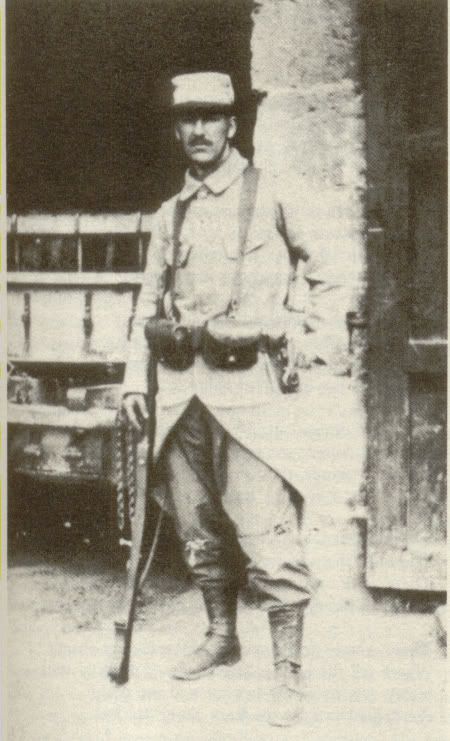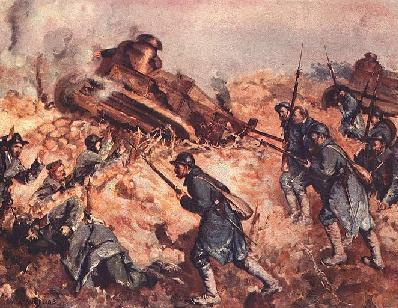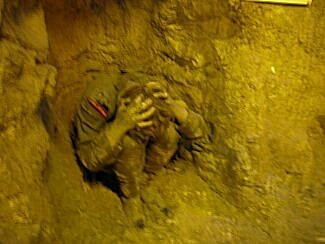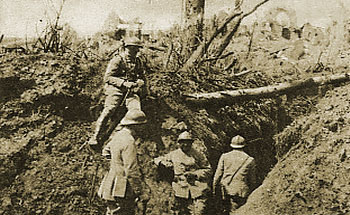SEEGER is at Toulouse, on Sunday, September 37th, 1914, and writes in his diary : "Fifth Sunday since my enlistment. The arbour of a little inn on the high road running East from Toulouse. Beautiful sunny afternoon. Peace. The stir of leaves, noise of poultry in the yards nearby, distant church bells, warm southern sunlight flooding the wide cornfields and vineyards.

"Everything is ready for departure to-day. We shall leave to-morrow or next day for an unknown destination. Some say Antwerp, some Châlons."

The next day he writes a letter to his mother, in the course of which he tells of hard work: "We have been putting in our time here at very hard drilling, and are supposed to have learned in six weeks, what the ordinary recruit in times, of peace takes all his two years at. We rise at 5 and work stops in the afternoon at 5. A twelve-hour day at one sou a day. I hope to earn higher wages than this in time to come, but I never expect to work harder. The early rising hour is splendid, for it gives one the chance to see the most beautiful part of these beautiful autumn days in the South."
We rise at 5 and work stops in the afternoon at 5. A twelve-hour day at one sou a day. I hope to earn higher wages than this in time to come, but I never expect to work harder. The early rising hour is splendid, for it gives one the chance to see the most beautiful part of these beautiful autumn days in the South." 
Villages are passed that the war had scarred. He writes : "Mailly apparently was about the furthest point reached by the Germans before the French success in the battle of the Marne forced them to retreat. There are numerous vestiges, of the recent battle. Some of the buildings in the villages are damaged by shells, some that we passed yesterday morning in the train, completely demolished.

The Voice of Mars
%20JPEG%20WM/(BSMC%201.16.I.33)%2020.jpg&w=399&h=285)
"Yesterday we heard cannon for the first time. All day long the occasional rumble of heavy siege guns came from the direction of the frontier. The distance must have been sixty or seventy kilometers. This makes drilling interesting.

"Last night two Germans, were found! in the woods near here by a patrol. One was dead from hunger and exposure, and the other nearly so. He said the reason they had not surrendered was that their officers had told them that they would be shot. He said also that there were thirty or thirty others in the neighbourhood."

"The Germans retreated along the road we marched over. Everywhere in the fields on either hand were the holes made by the obus and the graves beside them where the men fell. Though several weeks have passed since the battle, the fields are still littered with debris.  To-day we passed through the villages of Marisain and Bergères. The first was completely destroyed, not a house on the main street escaped the fire. Nothing but blackened walls and here and there the Inhabitants standing with sullen faces in their ruined doorways.
To-day we passed through the villages of Marisain and Bergères. The first was completely destroyed, not a house on the main street escaped the fire. Nothing but blackened walls and here and there the Inhabitants standing with sullen faces in their ruined doorways.  bergeres by mailliet
bergeres by mailliet
The scene of the marching column down the ruined street — a scene that will became familiar to us was imposing.

Through Mud and Moonlight

"We marched away a week ago through the forests under a moonlit sky. The road was merely a recent clearing through the trees to move the artillery over and was almost impassably muddy.

Arrived at the outer line of trenches, I was sent forward into a little trench in the fields to stay awake all night with half a dozen others on sentinel duty. Next day was .peaceful and we spent it perfecting the little bombproof shelters along the lines. It was a day well spent, for the Germans up to this time had been content to direct their fire over our heads on the French batteries behind us, began now to turn it on our trenches, informed no doubt by their aeroplanes that buzzed continually overhead. The salvoes of shrapnel began bursting in the woods all about us and we were compelled to stay under cover all day long.
It was a day well spent, for the Germans up to this time had been content to direct their fire over our heads on the French batteries behind us, began now to turn it on our trenches, informed no doubt by their aeroplanes that buzzed continually overhead. The salvoes of shrapnel began bursting in the woods all about us and we were compelled to stay under cover all day long.

Darkness would hardly begin before a fusillade would start from the lines near by, the cry 'Aux armes, aux tranchées!” would run from door to door and we would hasten out into the night to wait in the muddy ditches while bullets whistled about. But these fusillades would always die out, provoked probably only by the German patrols seeking to discover our position. At first I felt a little uneasy, but in the end only bothered. In the daytime we slept, oblivious to the shells that burst around us.
But these fusillades would always die out, provoked probably only by the German patrols seeking to discover our position. At first I felt a little uneasy, but in the end only bothered. In the daytime we slept, oblivious to the shells that burst around us.
 french officer
french officer
Invisible Foes

"The distressing thing about the kind of warfare we are up against is being harried by an invisible enemy and standing up against all the dangers of battle without any of it’s exhilaration or enthusiasm. From Belfort to the sea now it is the guerre des tranchées. In comparison with it a bayonet charge would be desirable and the command welcome to us all.
belfort
"After weeks of inaction in trenches where the danger of attack was slight, and there was nothing worse to be feared than the constant artillery fire, our company was moved last time into the little village of C——, the most dangerous part of the sector we are holding.

No Place for Nerves
"Four days almost without sleep, sometimes twelve out of twenty-four hours on guard in the most dangerous positions. It was in one of these that I came for the first time in immediate contact with the enemy in a most unfortunate affair. I was standing guard under the wall of a chateau park with a comrade, when a patrol sneaked up on the other side and threw a hand grenade over, which sputtered a moment at our feet and went out without exploding. Without crying to arms, I left the other sentry on the spot and walked down and called out the corporal of the guard. We walked back to the spot together, and had hardly arrived when another bomb came over a breach in the wall at this spot and poured a volley into our midst, killing the corporal instantly. The enemy got away before we had time to fire a shot.
Without crying to arms, I left the other sentry on the spot and walked down and called out the corporal of the guard. We walked back to the spot together, and had hardly arrived when another bomb came over a breach in the wall at this spot and poured a volley into our midst, killing the corporal instantly. The enemy got away before we had time to fire a shot.

Under No Illusion
"You are quite wrong about my not realising what I was going into when I enlisted. I had not been living for two years in Europe without coming to understand the situation very well, and I was under no illusion that the conflict which was to decide the fate of empires and remake the map of Europe would be a matter of a few months. I knew that it would be a fight to a finish.

"Never have I regretted doing what I am doing, nor would I at this moment be anywhere else than where I am. I pity the poor civilians who shall never have seen or known the things that we have seen and known. Great are the pleasures that they are continuing to enjoy and that we have renounced; the sense of being the instrument of destiny is to me a source of greater satisfaction.
Life Thrice Enriched
 zouave metal soldier 14/18
zouave metal soldier 14/18
"Nothing but good can befall the soldier, so he plays his part well. Come out of the ordeal safe and sound he has had an experience in the light of which all life thereafter will be three times richer and more beautiful; wounded, he will have the esteem and admiration of all men and the approbation of his own conscience; killed more than any other man he can face the unknown without misgiving — that is, so long as Death comes upon him in a moment of courage and enthusiasm, not faltering or of fear."
Come out of the ordeal safe and sound he has had an experience in the light of which all life thereafter will be three times richer and more beautiful; wounded, he will have the esteem and admiration of all men and the approbation of his own conscience; killed more than any other man he can face the unknown without misgiving — that is, so long as Death comes upon him in a moment of courage and enthusiasm, not faltering or of fear."
 thats a bit of alan seegers story but what was the first world war really about? Well maybe it was about keeping rich capitalists in the custom they were accustomed to. Remember that not one U.S senator had a son on the front line in the gulf wars. thats enough for me to start thinking about not going anywhere to make war against my fellow worker. The real problem is that most people dont realise the shit they are in and dont realise they are merely workers .Workers of all lands unite.
thats a bit of alan seegers story but what was the first world war really about? Well maybe it was about keeping rich capitalists in the custom they were accustomed to. Remember that not one U.S senator had a son on the front line in the gulf wars. thats enough for me to start thinking about not going anywhere to make war against my fellow worker. The real problem is that most people dont realise the shit they are in and dont realise they are merely workers .Workers of all lands unite.
"Everything is ready for departure to-day. We shall leave to-morrow or next day for an unknown destination. Some say Antwerp, some Châlons."

The next day he writes a letter to his mother, in the course of which he tells of hard work: "We have been putting in our time here at very hard drilling, and are supposed to have learned in six weeks, what the ordinary recruit in times, of peace takes all his two years at.
 We rise at 5 and work stops in the afternoon at 5. A twelve-hour day at one sou a day. I hope to earn higher wages than this in time to come, but I never expect to work harder. The early rising hour is splendid, for it gives one the chance to see the most beautiful part of these beautiful autumn days in the South."
We rise at 5 and work stops in the afternoon at 5. A twelve-hour day at one sou a day. I hope to earn higher wages than this in time to come, but I never expect to work harder. The early rising hour is splendid, for it gives one the chance to see the most beautiful part of these beautiful autumn days in the South." 
Villages are passed that the war had scarred. He writes : "Mailly apparently was about the furthest point reached by the Germans before the French success in the battle of the Marne forced them to retreat. There are numerous vestiges, of the recent battle. Some of the buildings in the villages are damaged by shells, some that we passed yesterday morning in the train, completely demolished.

The Voice of Mars
%20JPEG%20WM/(BSMC%201.16.I.33)%2020.jpg&w=399&h=285)
"Yesterday we heard cannon for the first time. All day long the occasional rumble of heavy siege guns came from the direction of the frontier. The distance must have been sixty or seventy kilometers. This makes drilling interesting.

"Last night two Germans, were found! in the woods near here by a patrol. One was dead from hunger and exposure, and the other nearly so. He said the reason they had not surrendered was that their officers had told them that they would be shot. He said also that there were thirty or thirty others in the neighbourhood."

 To-day we passed through the villages of Marisain and Bergères. The first was completely destroyed, not a house on the main street escaped the fire. Nothing but blackened walls and here and there the Inhabitants standing with sullen faces in their ruined doorways.
To-day we passed through the villages of Marisain and Bergères. The first was completely destroyed, not a house on the main street escaped the fire. Nothing but blackened walls and here and there the Inhabitants standing with sullen faces in their ruined doorways.  bergeres by mailliet
bergeres by maillietThe scene of the marching column down the ruined street — a scene that will became familiar to us was imposing.

Through Mud and Moonlight
"We marched away a week ago through the forests under a moonlit sky. The road was merely a recent clearing through the trees to move the artillery over and was almost impassably muddy.

 It was a day well spent, for the Germans up to this time had been content to direct their fire over our heads on the French batteries behind us, began now to turn it on our trenches, informed no doubt by their aeroplanes that buzzed continually overhead. The salvoes of shrapnel began bursting in the woods all about us and we were compelled to stay under cover all day long.
It was a day well spent, for the Germans up to this time had been content to direct their fire over our heads on the French batteries behind us, began now to turn it on our trenches, informed no doubt by their aeroplanes that buzzed continually overhead. The salvoes of shrapnel began bursting in the woods all about us and we were compelled to stay under cover all day long. 
Darkness would hardly begin before a fusillade would start from the lines near by, the cry 'Aux armes, aux tranchées!” would run from door to door and we would hasten out into the night to wait in the muddy ditches while bullets whistled about.
 But these fusillades would always die out, provoked probably only by the German patrols seeking to discover our position. At first I felt a little uneasy, but in the end only bothered. In the daytime we slept, oblivious to the shells that burst around us.
But these fusillades would always die out, provoked probably only by the German patrols seeking to discover our position. At first I felt a little uneasy, but in the end only bothered. In the daytime we slept, oblivious to the shells that burst around us. Invisible Foes

"The distressing thing about the kind of warfare we are up against is being harried by an invisible enemy and standing up against all the dangers of battle without any of it’s exhilaration or enthusiasm. From Belfort to the sea now it is the guerre des tranchées. In comparison with it a bayonet charge would be desirable and the command welcome to us all.

belfort
"After weeks of inaction in trenches where the danger of attack was slight, and there was nothing worse to be feared than the constant artillery fire, our company was moved last time into the little village of C——, the most dangerous part of the sector we are holding.

No Place for Nerves
"Four days almost without sleep, sometimes twelve out of twenty-four hours on guard in the most dangerous positions. It was in one of these that I came for the first time in immediate contact with the enemy in a most unfortunate affair. I was standing guard under the wall of a chateau park with a comrade, when a patrol sneaked up on the other side and threw a hand grenade over, which sputtered a moment at our feet and went out without exploding.
 Without crying to arms, I left the other sentry on the spot and walked down and called out the corporal of the guard. We walked back to the spot together, and had hardly arrived when another bomb came over a breach in the wall at this spot and poured a volley into our midst, killing the corporal instantly. The enemy got away before we had time to fire a shot.
Without crying to arms, I left the other sentry on the spot and walked down and called out the corporal of the guard. We walked back to the spot together, and had hardly arrived when another bomb came over a breach in the wall at this spot and poured a volley into our midst, killing the corporal instantly. The enemy got away before we had time to fire a shot. 
Under No Illusion
"You are quite wrong about my not realising what I was going into when I enlisted. I had not been living for two years in Europe without coming to understand the situation very well, and I was under no illusion that the conflict which was to decide the fate of empires and remake the map of Europe would be a matter of a few months. I knew that it would be a fight to a finish.

"Never have I regretted doing what I am doing, nor would I at this moment be anywhere else than where I am. I pity the poor civilians who shall never have seen or known the things that we have seen and known. Great are the pleasures that they are continuing to enjoy and that we have renounced; the sense of being the instrument of destiny is to me a source of greater satisfaction.
Life Thrice Enriched
"Nothing but good can befall the soldier, so he plays his part well.
 Come out of the ordeal safe and sound he has had an experience in the light of which all life thereafter will be three times richer and more beautiful; wounded, he will have the esteem and admiration of all men and the approbation of his own conscience; killed more than any other man he can face the unknown without misgiving — that is, so long as Death comes upon him in a moment of courage and enthusiasm, not faltering or of fear."
Come out of the ordeal safe and sound he has had an experience in the light of which all life thereafter will be three times richer and more beautiful; wounded, he will have the esteem and admiration of all men and the approbation of his own conscience; killed more than any other man he can face the unknown without misgiving — that is, so long as Death comes upon him in a moment of courage and enthusiasm, not faltering or of fear."  thats a bit of alan seegers story but what was the first world war really about? Well maybe it was about keeping rich capitalists in the custom they were accustomed to. Remember that not one U.S senator had a son on the front line in the gulf wars. thats enough for me to start thinking about not going anywhere to make war against my fellow worker. The real problem is that most people dont realise the shit they are in and dont realise they are merely workers .Workers of all lands unite.
thats a bit of alan seegers story but what was the first world war really about? Well maybe it was about keeping rich capitalists in the custom they were accustomed to. Remember that not one U.S senator had a son on the front line in the gulf wars. thats enough for me to start thinking about not going anywhere to make war against my fellow worker. The real problem is that most people dont realise the shit they are in and dont realise they are merely workers .Workers of all lands unite.

No comments:
Post a Comment